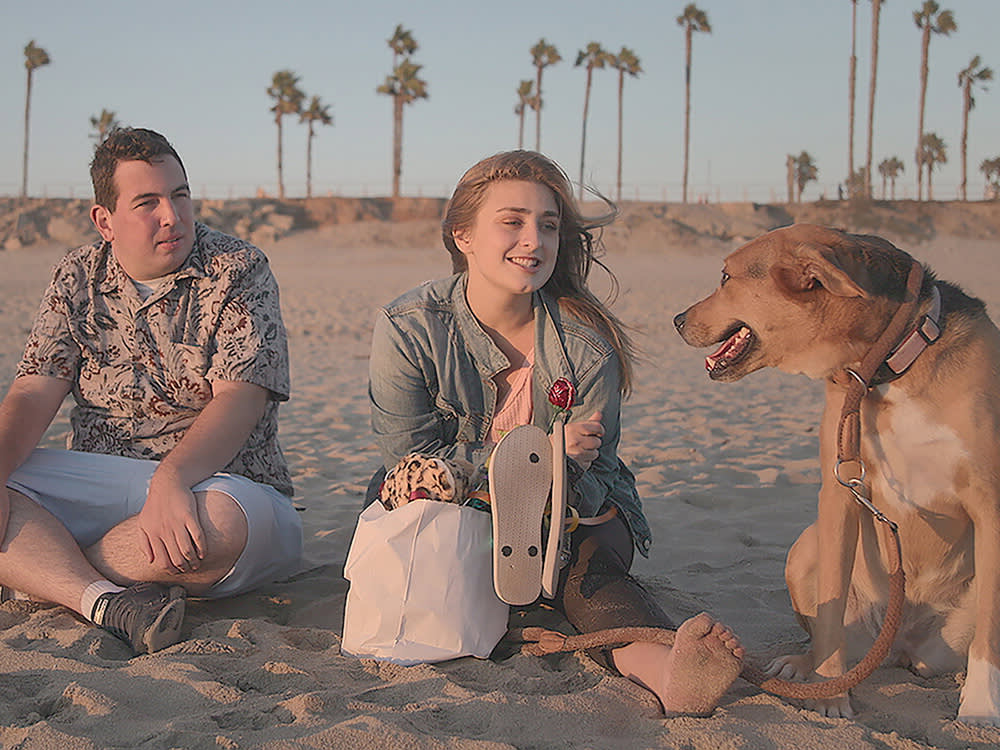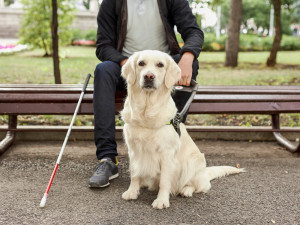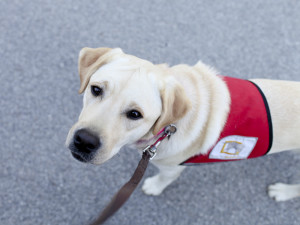On the Autism Spectrum? Get a Dog
Dr. Annie Bowes, a veterinarian on the spectrum, explains: “Dogs sense the world like we do, and don’t judge us.”

Share Article
If you’ve caught Netflix’s heartwarming docuseries Love on the Spectrum, you’ve probably checked yourself on many biases you may have about autism. The show reminds us that, in contrast to neurotypical prejudices, people on the spectrum desire companionship, feel empathy, and like us, can absolutely adore dogs.
In season 2, we meet Lexiopens in new tab, whose pink-haired owner Teodora (aka Teo) adores her so much, she even dyed her pup’s hair to match her own. Abbey, of Love on the Spectrum U.S., is another unabashed dog mom, with a constant companion (and hiking buddy) named Clementineopens in new tab. And Kaelynn, also from Love on the Spectrum US, can be seen doting on her adorable dog Finniganopens in new tab.

Save on the litter with color-changing tech that helps you better care for your cat.
In case you haven’t been paying attention: Dogs have proven to be loyal companions to all of us, and those on the spectrum are no exception. To that end, Dr. Annie Bowes, an Idaho-based veterinarian who is herself on the spectrum, penned Dogs & Autism. She explains to Kinship how canines offer a uniquely grounding presence for people with autism.
What is Autism Spectrum Disorder (ASD)?
“Explaining autism to someone who is neurotypical [people who don’t have autism] is much like explaining color to a person who is color-blind,” Dr. Bowes explained. “That’s because autism is a sensory issue, a part of us that doesn’t deal with language. Instead, it deals with feelings. Making matters worse, it’s stronger than language and words. Fortunately, this is precisely the cognitive function that dogs lead with and that makes them such perfect companions of those with autism.”
According to Dr. Bowes, autism affects the body’s limbic system and a set of neurons called amygala that live there. For people without autism, the brain’s frontal lobe, which houses logic, words and executive thinking, is dominant. For those on the autism spectrum, the world is a sensory place, as is the case with dogs. For example, before a lightning storm, many dogs express fear and will hide; they are also known to sense earthquakes before the earth trembles. Warning a person of an impending seizure or diabetic sugar imbalance is in their repertoire, and they can sense when people are sad, happy, or afraid, and respond accordingly.
Scientist Temple Grandin, who is autistic, also describes how animals are similar to autistic people, saying “autistic people don’t think in language, we think in pictures. During my thinking process I have no words in my head at all, just pictures. So, if you say the word ‘teapot’ I start to see teapots, like a teapot slide show of teapots. Animals don’t think in language; they are visual thinkers too. When you think in pictures, it has to be specific in order to form concepts.”
Social Benefits of Dogs for People with Autism
“Everybody knows that it’s always nice to have a friend near who thinks like you do,” Dr. Bowes explained, “and that’s why those with autism benefit so much from having a dog. Dogs sense the world like we do, and don’t judge us or demand that we pull ourselves together. A dog senses what you need and gives it to you unconditionally.”
To a great extent, Dr. Bowes considers herself fortunate in her battle with the perception of her condition. Her father, who also has autism, spent years enduring a foster-care system that was ignorant of his problems and unwilling to understand. The one benefit he did enjoy, as well as an understanding he passed on to his daughter, was dogs.
“During the worst time in my father’s life, he got a dog, a black Labrador Retriever named Queenie,” Bowes recalls. “My father and Queenie were inseparable. Better yet, Queenie protected him and was his best friend, regardless of what was happening in his life. She loved him wholeheartedly and accepted him until her death. Perhaps best of all, however, was the fact that she helped teach him to be gentle and trusting, traits that endeared him to my mother and has made him successful as a father, businessman, and friend.”
Dr. Bowes added that her father also recognized that she was like him and would benefit from the presence of a dog. “My father always made sure that I have had a dog my entire life,” Dr. Bowes said. “He understood that a dog’s love would make a huge difference in my life, so he fostered it.
“Acceptance is the one thing all parents should hope their children achieve, especially their children with autism — in fact, anybody outside of the social norm. Fortunately, acceptance isn’t something that comes with a high price tag. In fact, it can often come with four legs and a wagging tail. Further, I can say unconditionally that anyone with a dog in their home will see each member of the family bloom with their presence, whether there is a person with autism in that family or not.”
For Dr. Bowes, that first dog was a farm reject (he chased chickens) who originally came from a shelter. “Buford was a German Shepherd/Saint Bernard mix who weighed in at more than 120 pounds. He was huge, but as intimidating as his size was to most people, he was a great protector me,” Dr. Bowes said. “When I started talking, I talked to him. And because he wouldn’t correct me, I gained confidence in my speech. This helped me in my social interactions, and when a contact didn’t work out, I still had Buford to go back to.”
What has long been suspected by those with autism and other issues has only recently begun to be corroborated by science. In a study reported on in Newsweek , it is suggested that those who had childhood pets may be mentally healthier than those without. They cure the loneliness, sadness, and frustration experienced by so many people. In fact, dog owners are 0.6 times less likely to visit a doctor due to illness. This is thought to be due to the dog walking and other activities which help people lose weight, increase relaxation, and other benefits. Although studies on this topic are still in their early stages, the message is clear: on the autism spectrum? Get a dog.
Michael W. Michelsen Jr
Michael W. Michelsen Jr. is a freelance writer who lives with his wife and their two Dachshunds, who have both taught Mike many lessons about growing older.
Related articles
![Unrecognizable man sitting on a park bench with his service dog]()
What is the Difference Between Service Dogs and Therapy Dogs?
Both are perfect angels, to be clear.
![Minna Lee smiling at the camera while holding her dog, Benny the Corgi, who is dressed in a Sherlock Holmes Halloween costume]()
5 Ways Minna Lee and Her Corgi Prioritize Their Collective Mental Health
The wellness entrepreneur on living with and learning from her anxious dog, from taking breaks to setting boundaries.
![Dog and Woman looking out window moodily]()
How My Dog Helped Me Get Through the Pandemic Alone
“She was my lockdown companion, but I had to learn to slowly navigate my fears and anxiety without her as my constant companion.”
![A service dog for PTSD walking outside looking up at the camera]()
How Service Dogs Can Ease Veterans’ PTSD
According to a study, trained service dogs can interrupt panic attacks, wake veterans from nightmares, and more.





